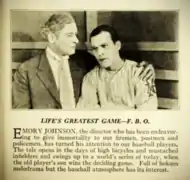Life's Greatest Game
Life's Greatest Game is a 1924 American silent drama directed by Emory Johnson. The film stars Johnnie Walker and Tom Santschi. Emilie Johnson created this story focusing on America's greatest pastime – baseball. Emilie revolved her story around an attempted fix of the world series. Emilie used the Black Sox Scandal of 1919 as inspiration.
| Life's Greatest Game | |
|---|---|
 Movie Poster | |
| Directed by | Emory Johnson |
| Produced by | Emory Johnson Productions |
| Written by | Emilie Johnson Story |
| Starring | Johnnie Walker |
| Cinematography | Paul Parry |
| Distributed by | Film Booking Offices of America |
Release date |
|
Running time | 7 reels |
| Country | USA |
| Language | Silent (English intertitles) |
The movie was released on September 28, 1924, by Film Booking Offices of America.
Plot
Jack Donovan, played by Tom Santschi, is a pitcher for the Chicago Cubs. Jack is approached by local pool hall owner and gambler Mike Moran, played by David Kirby. Mike asks Jack to throw a game he wants to place a wager. Jack refuses. Moran decided to retaliate.
Moran makes it appear he was having an affair with Jack's wife – Jean. Jack is enraged over his wife's supposed dalliance. He storms down to the pool hall and beats-up Moran. After the beating is over, Moran confesses it was all a setup. Jack wants to apologize to Jean, but his wife and their small boy, Jackie Jr, played by Dick Brandon, has set sail for Europe.
The ocean liner the Donovans are traveling on strikes an iceberg and sinks. Both Jean and their son are reported lost. Since Jack now believes his family has died in the tragedy, he decides to bury his grief by dedicating himself to baseball.
Fast forward 20 years. Jack Donovan has stayed in baseball and is now the manager of the New York Giants. As the story continues, Jack's wife and Jackie Jr survived and were not lost at sea. Jack Jr is now a grown man and a recent college graduate. Jack Donovan Jr. played by Johnnie Walker. Jack Jr's mother starts to have cash-flow problems. To help her out, Jack Jr decides to become a professional baseball player. Even though it is against his mother's wishes, he accepts an offer from the New York Giants.
Jack Jr reports to the Giants and recognizes his father. Jack Jr still has a chip on his shoulder – he could never forgive the father he believed had abandoned him when he was a youngster. He patiently waits for the right time to strike.
The New York Giants make it to the World Series. The Giants will play the New York Yankees. With series on the line, Jack Jr is called in as a pinch hitter. Jack Jr decides now is the time to get his revenge against Jack Sr for all the years of neglect. Jack Jr decides to deliberately strikeout, consequently losing the World Series for the Giants. At the last minute, he has a change of heart. Instead of striking out, he hits the game-winning home run. The New York Giants win the World Series.
Jack Jr then finds out his mother is in poor health. He decides to reunite his ailing mother with his father so they can spend their remaining years together. Jack Jr then pops the question to his sweetheart Nora played by Gertrude Olmstead.
Cast
Actor Role Tom Santschi Jack Donovan Jane Thomas Mary Donovan Johnnie Walker Jackie Donovan Jr. (age 20) David Kirby Mike Moran Gertrude Olmstead Nora Malone Dick Brandon Jack Donovan Jr. (age 3) Tommy Hicks Fat Kid (uncredited)
Preservation status
A report created by film historian and archivist David Pierce for the Library of Congress claims:
- 75% of original silent-era films have perished.
- 14% of the 10,919 silent films released by major studios exist in their original 35mm or other formats.
- 11% survive in full-length foreign versions or on film formats of lesser image quality.[1][2] Many silent-era films did not survive for reasons as explained on this Wikipedia page.
Emory Johnson directed 13 films - 11 were silent, and 2 were Talkies. Life's Greatest Game was the sixth film in Emory Johnson's eight-picture contract with FBO. The film's original length is listed at 7 reels. According to the Library of Congress website, this film has a status of - No holdings located in archives, thus it is presumed all copies of this film are lost.[3]
Gallery
- Cast Members and Director
 Johnnie Walker
Johnnie Walker
Jackie Donovan Jr. (age 20).jpg.webp) Jane Thomas
Jane Thomas
Mary Donovan Gertrude Olmstead
Gertrude Olmstead
Nora Malone Tom Santschi
Tom Santschi
Jack Donovan David Kirby
David Kirby
Mike Moran Emory Johnson
Emory Johnson
Director
 Still combined Newspaper article
Still combined Newspaper article Newspaper advertisement
Newspaper advertisement Newspaper advertisement
Newspaper advertisement Newspaper advertisement
Newspaper advertisement
References
- Pierce, David. "The Survival of American Silent Films: 1912-1929" (PDF). Library Of Congress. Council on Library and Information Resources and the Library of Congress. Retrieved November 18, 2020.
- Slide, Anthony (2000). Nitrate Won't Wait: History of Film Preservation in the United States. McFarland. p. 5. ISBN 978-0786408368. Retrieved March 25, 2013.
It is often claimed that 75 percent of all American silent films are gone and 50 percent of all films made prior to 1950 are lost, but such figures, as archivists admit in private, were thought up on the spur of the moment, without statistical information to back them up.
- The Library of Congress American Silent Feature Film Survival Catalog: Life's Greatest Game